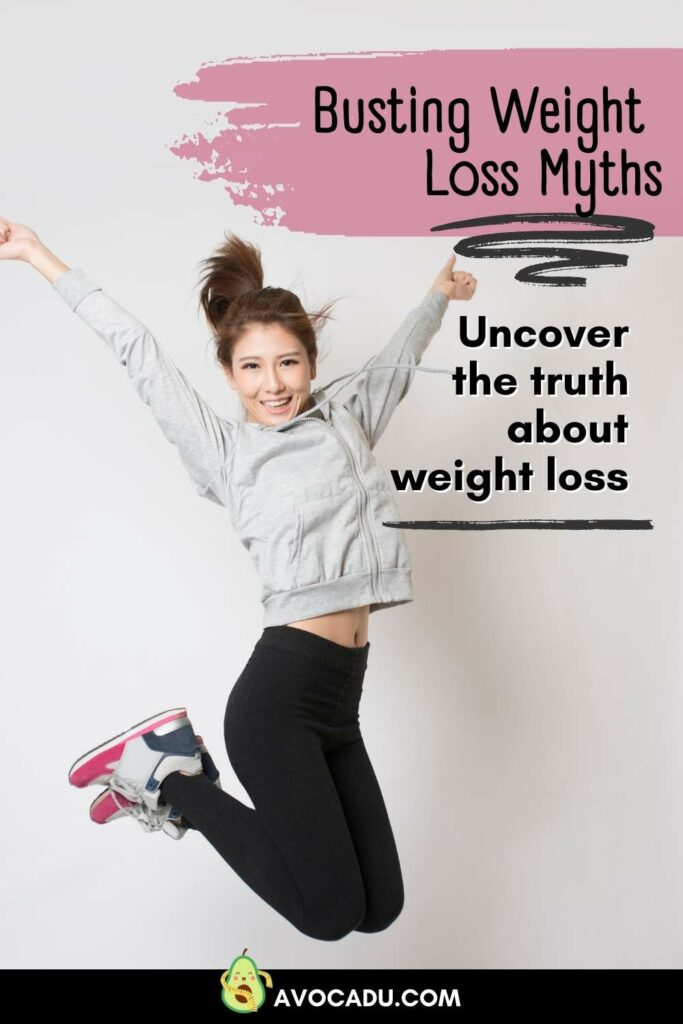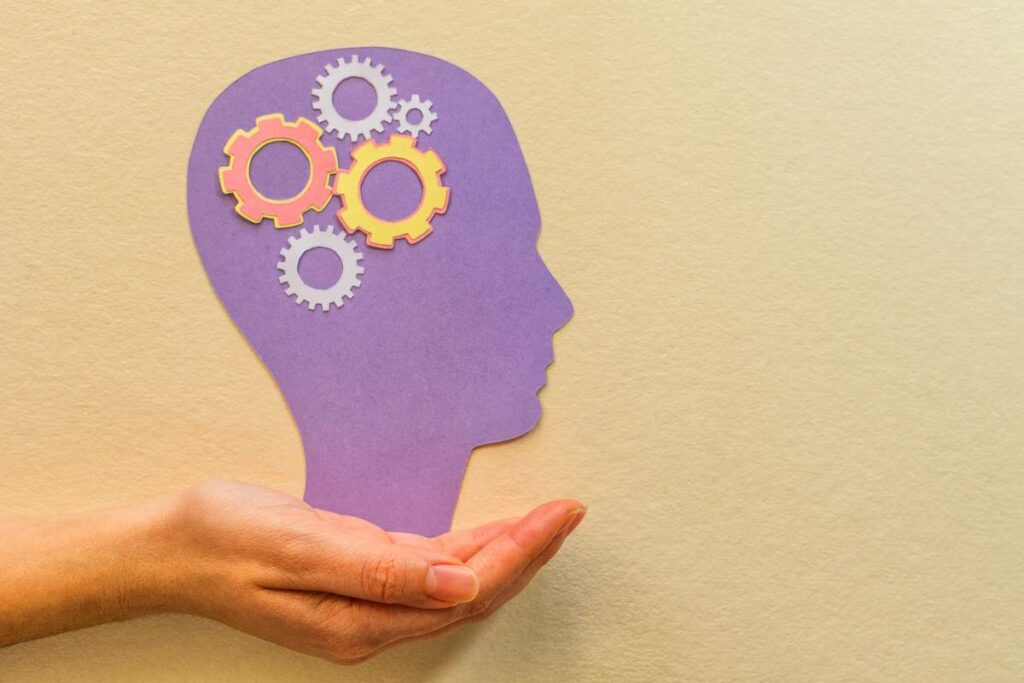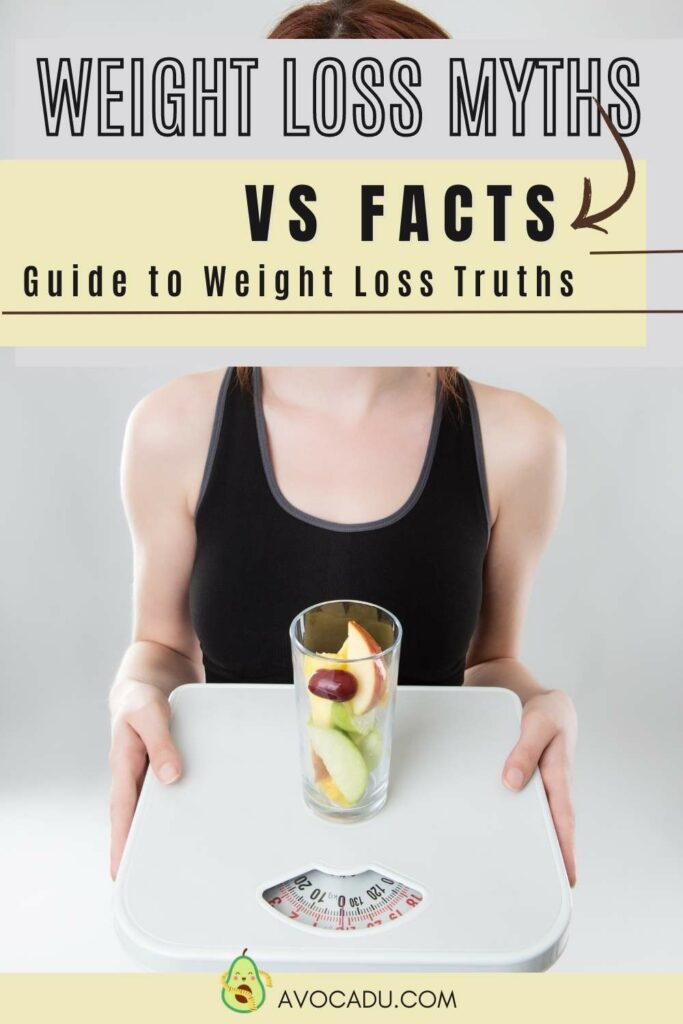Weight Loss Myths vs Facts: A Woman’s Guide
Weight loss—a topic that has captivated public attention for decades. In the digital age we live in, the sheer volume of information (and misinformation) can make discerning fact from fiction feel akin to solving a complex puzzle.
Has the thought ever crossed your mind, wondering which is a fact and which is a tall tale?
Unraveling the truth about weight loss can sometimes seem as challenging as mastering a foreign language.
No worries, though! Consider this your ultimate guide for dispelling weight loss myths vs facts.
Are you prepared to strip away the layers of confusion and gain a clear perspective on your weight loss journey? Let’s get started.

This post may contain affiliate links, which helps keep this content free. Please read our disclosure for more info.
Understanding Weight Loss
Before we jump in, let’s get our basics right. The term “weight loss” is more than just a popular phrase—it’s a journey that involves patience, dedication, and most importantly, a commitment to embracing healthier lifestyle changes.
This isn’t about adhering to a fad diet for a few weeks or pinning our hopes on those so-called “miracle” slimming pills. If it were that simple, we’d all be flaunting our dream bodies by now, wouldn’t we?
When we talk about weight loss, it’s essential to understand that it’s not an overnight process, nor is it a linear one.
It’s about making consistent, long-term changes in our lifestyle, and this journey can look different for everyone.
It involves a combination of various elements that work together to help you achieve your goals in the healthiest way possible.
Eating habits play a pivotal role. This doesn’t mean starving yourself or completely eliminating certain food groups (we’re looking at you, carbs!).

Instead, it’s about understanding the nutritional needs of your body and nourishing it with a balanced diet. This includes a mix of proteins, carbohydrates, fats, vitamins, and minerals, all in the right amounts.
Physical activity is also key. Whether it’s walking, jogging, swimming, yoga, or a high-intensity workout, what matters is that you’re moving.
Regular exercise not only helps in burning calories but also boosts your metabolism, improves your mood, and contributes to your overall health.
Lastly, but certainly not least, your mental well-being is a crucial factor in your weight loss journey.
Stress, anxiety, or depression can often lead to overeating or unhealthy eating patterns. Prioritizing self-care, good sleep, and stress management techniques is just as important as a healthy diet and exercise.
Real weight loss involves a holistic approach that considers all these aspects—healthy eating habits, regular physical activity, and a positive mindset. This sets the stage for sustainable weight loss and a healthier you.
Weight Loss Myths and Facts
Let’s keep in mind that when it comes to weight loss, misconceptions are as common as diet trends.
From outdated advice to misunderstood science, weight loss myths can be tricky to navigate.
Ready to separate the wheat from the chaff? Let’s tackle these myths one by one and reveal the facts hidden beneath them.
Myth 1: You must eliminate all carbohydrates to lose weight

Ah, carbohydrates, they’ve been through quite the roller coaster ride, haven’t they? Here’s the thing—while it’s true that carbs aren’t technically an essential macronutrient, they sure do make life a lot more enjoyable (and, for many of us, a lot more energetic!).
The primary role of carbohydrates in our diet is to provide energy. Particularly, they feed our brain and muscles during physical activities. But not all carbs are created equal.
The key is to focus on complex carbs, found in whole grains, fruits, and vegetables, which take longer to break down and provide a steadier source of energy.
On the other hand, simple carbs, like those in white bread and sugary snacks, can cause blood sugar spikes and crashes, leaving you feeling hungry sooner.
Action step: While it’s not necessary to completely cut out carbs from your diet, be mindful of the type and quantity you’re consuming.
The next time you’re grocery shopping, consider whole grain options like brown rice or quinoa. And remember, fruits and veggies are your friends!
Myth 2: Skipping meals can help in weight loss

Now, who among us hasn’t skipped a meal or two with the hope of shedding some extra weight? You’re definitely not alone.
But here’s the reality check: regularly skipping meals isn’t the best strategy for weight loss. In fact, it can backfire, leading to potential overeating later in the day and causing a disturbance in your metabolism.
So, does that mean we should always stick to the old-school rule of three balanced meals a day?
Not necessarily. You see, it’s not about sticking to a fixed number of meals, but rather ensuring that you’re meeting your body’s nutrient and calorie needs, whether that’s through three meals a day or six smaller ones.
Now, you might be thinking, “What about intermittent fasting? Isn’t that essentially skipping meals?”
A good question! Intermittent fasting does involve scheduled periods of eating and fasting, and it’s been shown to offer many health benefits.
However, the key point is that during the eating periods, you should still be consuming an adequate amount of calories and nutrients, particularly protein.
It’s not about drastically restricting your overall calorie intake, but rather about when you eat.
Action step: Listen to your body. If you feel hungry, eat. Don’t ignore your hunger cues in the name of weight loss.
Consider planning your meals in advance to ensure you’re consistently nourishing your body with the right nutrients.
And if you’re interested in intermittent fasting, remember it’s not a license to restrict calories severely.
Always ensure you’re meeting your nutrient and calorie needs during your eating periods. Consider consulting with a dietitian to make sure you’re on the right track!
Myth 3: All calories are created equal

There’s a common belief in weight loss circles that a calorie is a calorie, no matter where it comes from.
While there’s truth in the simple equation of ‘calories in vs calories out’ when it comes to weight loss, this doesn’t give the whole picture.
Not all calories are created equal, and the source of these calories matters significantly for our overall health and weight management.
Let’s take an example: imagine eating a 200-calorie candy bar versus consuming 200 calories from a plate of mixed vegetables and lean protein.
While both provide the same amount of energy, they differ significantly in nutritional value. The candy bar offers a quick rush of sugar with very little nutritional benefit, leading to a spike and crash in blood sugar levels, which could leave you feeling hungry sooner.
On the other hand, the vegetables and lean protein provide a rich mix of vitamins, minerals, fiber, and protein, which not only offer sustained energy but also keep you fuller for longer.
Furthermore, your body processes different types of calories differently. Protein, for instance, requires more energy to metabolize than fat or carbohydrates, leading to a higher calorie burn.
So, it’s important to consider not just the number of calories, but also the quality of these calories.
Action step: Make it a habit to read food labels, focusing not just on the calorie content but also on the nutritional information.
Look at the breakdown of protein, fats, and carbs, and the presence of other essential nutrients.
You’ll be amazed to see how much you can learn about your food! And remember, a balanced diet comprising lean proteins, healthy fats, fruits, vegetables, and yes, even some carbs, is key to healthy and sustainable weight loss.
Myth 4: Extreme exercise is the only way to lose weight

The image of intense workouts—sweat-drenched shirts, breathless panting, and endless hours in the gym—has become synonymous with weight loss.
While those action movie montages can be motivating, they can also give the false impression that you need to train like an Olympian to see any weight loss results.
But here’s the reality: extreme exercise isn’t the golden ticket to weight loss.
In fact, the relationship between diet and exercise in the weight loss equation is NOT an equal 50/50 split.
When it comes to shedding pounds, what you eat often has a larger impact than how much you sweat. However, this doesn’t mean exercise doesn’t play a crucial role.
Regular physical activity is key for maintaining overall health, improving cardiovascular fitness, enhancing mood, and helping prevent a host of chronic diseases.
So, what kind of exercise should you be doing? The best answer is a combination of different types.
Cardio, strength training, and flexibility exercises all have their unique benefits and contribute to overall fitness. Instead of extreme, unsustainable workout regimens, aim for consistent, balanced, and enjoyable activities.
Whether it’s a brisk walk, a yoga class, or a weight lifting session, the most important thing is that you’re moving regularly.
Remember, the goal here is to create sustainable change. This isn’t about punishing your body with grueling workouts, but rather about nurturing it with balanced physical activity.
Action step: If you’re unsure about where to start, consider consulting with a fitness trainer. They can help develop a balanced exercise routine tailored to your needs and goals, keeping in mind your current fitness level and any potential health issues.
Myth 5: Supplements and detox teas can replace a healthy diet

In an era of instant gratification, the allure of quick fixes like weight loss supplements and detox teas can be hard to resist.
They’re marketed as the magic bullet to all your weight loss problems, promising remarkable results with little effort.
However, it’s essential to understand that these products, at their very best, are only supplemental to a healthy lifestyle.
They can’t and shouldn’t replace the fundamentals of a balanced diet and regular physical activity.
Weight loss supplements and detox teas may claim to speed up metabolism, reduce appetite, or cleanse your body, but their effectiveness varies greatly and is often not backed by solid scientific evidence.
Plus, these products can sometimes lead to unwanted side effects, like digestive issues or nutrient deficiencies.
It’s also important to remember that the weight loss achieved through such methods is often temporary, as they don’t help in establishing the healthy habits required for long-term weight management.
When it comes down to it, there’s no substitute for a balanced diet full of fresh fruits, vegetables, lean proteins, and whole grains.
Coupled with regular physical activity and a positive mindset, this is the foundation for sustainable weight loss and overall health.
Action step: Next time you’re tempted to spend money on a “miracle” weight loss product, consider investing instead in fresh produce for nutrient-packed meals, or a good pair of running shoes for your daily exercise routine.
After all, the secret to weight loss isn’t in a magic pill or potion, but in the small, consistent steps you take towards a healthier lifestyle.
The Role of Mental Health in Weight Loss

One often overlooked factor in the weight loss conversation is mental health. It’s easy to focus on diet and exercise as the main components of weight loss, but our mental well-being plays an integral role in this journey as well.
Stress, anxiety, and depression can all impact our weight in complex and sometimes surprising ways.
Stress, for instance, can lead to changes in eating behaviors and trigger cravings for high-fat, high-sugar “comfort foods.”
This is largely due to the body’s stress hormone, cortisol, which can also promote fat storage, particularly in the abdominal area.
Anxiety and depression, too, can disrupt healthy eating and exercise habits.
For some, these mental health conditions might cause a loss of appetite or a lack of motivation to exercise. For others, they might lead to overeating or emotional eating.
On the flip side, maintaining a positive mental state can significantly enhance our weight loss efforts. A happy mind often encourages healthier choices and habits.
It improves our motivation to exercise, helps us resist unhealthy cravings, and makes us more likely to stick to our weight loss plans.
So, how can we take care of our mental health while trying to lose weight? It’s all about finding stress-reducing activities that you love and incorporating them into your daily routine.
This could be anything from yoga and meditation to painting, dancing, or taking a leisurely walk in the park.
Action step: Begin by identifying a stress-busting activity that you genuinely enjoy. Make it a point to schedule time for this activity in your day, even if it’s just for a few minutes.
Weight loss isn’t just about taking care of your body, but also about nurturing your mind. Mental health is a key player in this journey, and taking steps to improve it can significantly enhance your overall weight loss efforts.
Personalizing Your Weight Loss Journey

Weight loss is not a one-size-fits-all kind of journey. What works for one person might not work for another.
We are all unique individuals with different bodies, metabolism rates, preferences, lifestyles, and even gut microbiomes. All these factors, and more, play a significant role in how we gain or lose weight.
Perhaps you’ve tried to emulate a friend or celebrity who had great success with a specific diet, only to find that it didn’t yield the same results for you.
Or maybe you’ve bounced from one diet trend to another, finding short-term success but struggling to maintain the weight loss long-term. These experiences can be disheartening and may even lead you to believe that weight loss is simply impossible for you.
But here’s the thing: just as no two people are exactly alike, no two weight loss journeys are either.
We each need to find the diet and exercise approach that works best for our unique selves.
This means taking into account personal factors like food preferences, dietary restrictions, physical abilities, work schedules, family responsibilities, and even individual health conditions.
The good news is, you don’t have to navigate this journey alone. Dietitians and nutritionists are trained to understand the complex interplay of food, physiology, and lifestyle.
They can help you develop a personalized weight loss plan, one that is tailored to your unique body, needs, and circumstances.
Action step: If you’re feeling lost or overwhelmed in your weight loss journey, consider reaching out to a dietitian or nutritionist.
They can guide you through the process of creating a personalized weight loss plan, one that respects your individuality and sets you up for long-term success.
Remember, your journey to weight loss is uniquely yours, and it’s okay to seek out the support and guidance you need to navigate it successfully.
Wrapping Up and An Invitation to Join the 21-Day Fat Loss Challenge
We’ve discussed the landscape of weight loss myths, shedding light on common misconceptions and separating fact from fiction.
It’s crucial to remember that weight loss isn’t a sprint to a finish line—it’s more akin to a marathon, a continuous journey that involves adopting and maintaining balanced habits, all while being wary of those pesky myths.
The road to weight loss and better health isn’t always easy. It’s full of trials and tribulations, but it’s also filled with growth, learning, and often, a newfound appreciation for our bodies and what they’re capable of.
So, let’s make a pact to take this journey one step at a time, to embrace the process and not just fixate on the outcome.
As a next step, consider joining our 21-Day Fat Loss Challenge program.

This program is designed to help kickstart your weight loss journey and equip you with the tools, tips, and strategies to make sustainable changes.
And finally, your experiences and insights are invaluable. If you’re comfortable doing so, please share your personal experiences, victories, and even struggles with weight loss in the comments below.
You never know who might find inspiration or comfort in your story. Together, let’s create a supportive community where we can learn from each other and cheer each other on.

